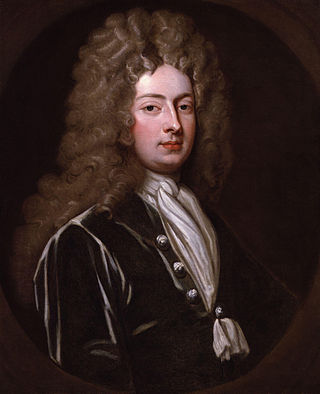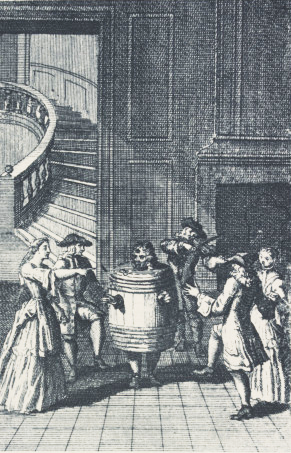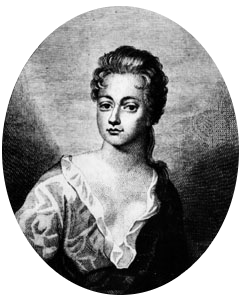Related Research Articles

William Congreve was an English playwright, poet and Whig politician. His works, which form an important component of Restoration literature, were known for their use of satire and the comedy of manners genre. Notable plays he wrote include The Old Bachelor (1693), The Double Dealer (1693), Love for Love (1695), The Mourning Bride (1697) and The Way of the World (1700) which established him a great writer in the genre of comedy of manners. He died in London, and was buried at the Poets' Corner in Westminster Abbey.

Restoration comedy is English comedy written and performed in the Restoration period of 1660–1710. Comedy of manners is used as a synonym for this. After public stage performances were banned for 18 years by the Puritan regime, reopening of the theatres in 1660 marked a renaissance of English drama. Sexually explicit language was encouraged by King Charles II (1660–1685) personally and by the rakish style of his court. Historian George Norman Clark argues:
The best-known fact about the Restoration drama is that it is immoral. The dramatists did not criticize the accepted morality about gambling, drink, love, and pleasure generally, or try, like the dramatists of our own time, to work out their own view of character and conduct. What they did was, according to their respective inclinations, to mock at all restraints. Some were gross, others delicately improper.... The dramatists did not merely say anything they liked: they also intended to glory in it and to shock those who did not like it.
Peter Anthony Motteux was a French-born English author, playwright, and translator. Motteux was a significant figure in the evolution of English journalism in his era, as the publisher and editor of The Gentleman's Journal, "the first English magazine," from 1692 to 1694.
This article contains information about the literary events and publications of 1756.
This article contains information about the literary events and publications of 1700.
This article contains information about the literary events and publications of 1698.
This article contains information about the literary events and publications of 1696.
This article contains information about the literary events and publications of 1679.
This article contains information about the literary events and publications of 1674.

This article contains information about the literary events and publications of 1670.
This article presents lists of the literary events and publications in 1664.
This article contains information about the literary events and publications of 1663.
This article contains information about the literary events and publications of 1630.
Susanna Verbruggen, aka Susanna Mountfort, was an English actress working in London.

John Dennis was an English critic and dramatist.

Jacob Tonson, sometimes referred to as Jacob Tonson the Elder, was an eighteenth-century English bookseller and publisher.

Anne Bracegirdle was an English actress and soprano. Most of the plays she performed in involved singing as well as acting. She often performed music written for her by the composer John Eccles, and also sung music written for her by Henry Purcell. She became particularly well known for the song "I burn" which Eccles originally wrote for Bracegirdle to perform in Thomas D'Urfey's play The Comical History of Don Quixote (1694). She also sang music by Eccles in the play The Richmond Heiress (1693) and in William Congreve opera The Judgment of Paris. In 1706 she starred in Giuseppe Fedeli's opera The Temple of Love.
Events from the year 1693 in England.

Cave Underhill (1634–1710?) was an English actor in comedy roles.
Joseph Williams was an English stage actor of the seventeenth and early eighteenth century.
References
- 1 2 Hochman, Stanley. McGraw-Hill Encyclopedia of World Drama. Vol. 4. p. 542.
- ↑ "When Was the First Book Printed in NYC?". New–York Historical Society . Retrieved 2013-10-29.
- ↑ Eames, Wilberforce (1928). The First Year of Printing in New York, May, 1693 to April, 1694. New York Public Library.
- 1 2 3 Palmer, Alan; Palmer, Veronica (1992). The Chronology of British History. London: Century Ltd. pp. 198–200. ISBN 0-7126-5616-2.
- ↑ Edward A. Bloom; Lillian D. Bloom (31 October 2013). Joseph Addison and Richard Steele: The Critical Heritage. Routledge. p. 357. ISBN 978-1-136-17180-2.
- ↑ Mullan, John (2007). Anonymity. London: Faber. p. 142. ISBN 978-0-571-19514-5.
- ↑ Cunningham, Hugh. "Re-inventing childhood". open2.net. Open University . Retrieved 2010-06-16.
- ↑ Hugh Chisholm; James Louis Garvin (1926). The Encyclopædia Britannica: a dictionary of arts, sciences, literature & general information. The Encyclopædia Britannica Company, Ltd. p. 564.
- ↑ Heiner F. Klemme; Manfred Kuehn (30 June 2016). The Bloomsbury Dictionary of Eighteenth-Century German Philosophers. Bloomsbury Academic. p. 829. ISBN 978-1-4742-5597-4.
- ↑ Emma Helen Blair; James Alexander Robertson (1973). The Philippine Islands, 1493-1898: Explorations by Early Navigators, Descriptions of the Islands and Their Peoples, Their History and Records of the Catholic Missions, as Related in Contemporaneous Books and Manuscripts. Cachos Hermanos. p. 151.
- ↑ Yust, Walter (1952). Encyclopaedia Britannica: A New Survey of Universal Knowledge. Encyclopaedia Britannica. p. 451.